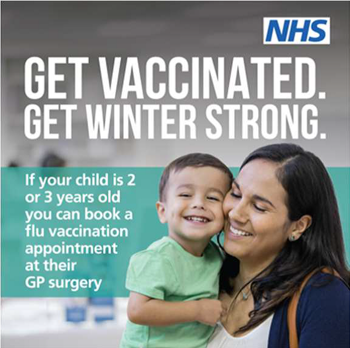Children’s flu vaccination programme gets underway in Cheshire and Merseyside
Friday, 15 September 2023

The annual NHS flu vaccination programme for children aged 2-3, school age children and children over 6 months with certain health conditions is underway in Cheshire and Merseyside.
The NHS in Cheshire and Merseyside is calling on parents to ensure children’s consent forms are completed, and that eligible pre-schoolers are booked in for appointments at the GP practice, to stop the spread of flu this autumn and winter.
More than 415,000 children across the region in school years Reception to Year 11 are eligible for the flu vaccine in the form of a nasal spray, delivered in schools by immunisations teams. Children aged 2 and 3 (on or before 31 August) are eligible for the free nasal spray via their GP practice.
Children aged between 6 months and 2 years with a long-term health condition that makes them at higher risk from flu will be offered a flu vaccine injection instead of the nasal spray. This is because the nasal spray is not licensed for children under 2 years old.
Flu rebounded last winter after being kept low since March 2020 by COVID-19 control measures. Preliminary analysis by the UK Health Security Agency (UKHSA) found that deaths linked to flu last winter were the highest since 2017-18. Nationally, over 10,000 children were hospitalised last winter due to the infection. Vaccination effectiveness data from last year showed that the vaccines reduced the risk of hospitalisations by two thirds.
Flu vaccine is the best protection we have against an unpredictable virus. Flu can be a very unpleasant illness in children causing fever, extreme tiredness, aching muscles and joints, stuffy nose, dry cough, and sore throat. Complications of flu include painful inflammation inside the ear, and pneumonia that makes breathing difficult.
Each winter thousands of children need to go to hospital for treatment, including intensive care, with children under the age of 5 years having one of the highest rates of hospital admissions due to flu. By getting vaccinated, your child also protects others around them, including babies, grandparents and people with weak immune systems.
Professor Ian Ashworth, Director of Population Health for NHS Cheshire and Merseyside, said:
“In winter, children pick up a lot of viruses, but having the flu vaccination will give your child the best protection from catching and spreading flu.
“Flu can make children very unwell, and in the school environment the virus can spread rapidly, which is why we’re prioritising the roll out of the flu programme to children first.
"School children will be able to receive their vaccination at school, and all 2-3 year olds will be invited to receive their vaccination at their GP practice.
“The vaccine is the best way to protect our children, their friends and family against the flu.”
If your child has a medical condition that makes them more at risk from flu, such as asthma or cerebral palsy, you can get them vaccinated at the GP practice if you don’t want to wait for the school session. Children who can’t have the nasal spray for medical or faith reasons should have an injected flu vaccine instead, also provided free by the NHS.
The nasal spray vaccine does not cause flu, because the viruses in it have been weakened to prevent this from happening, but the weakened viruses help each child to build up immunity. This means vaccinated children will be better able to fight off flu. The vaccine is absorbed very quickly in the nose so even if the child sneezes immediately after having had the spray, there’s no need to worry that it hasn’t worked.
Side effects of the nasal spray are typically mild if present at all. Children may develop a runny or blocked nose, headache, general tiredness, and some loss of appetite. However, these are much milder than developing flu or complications of flu, and some of these will be due to common cold viruses circulating at the time the flu vaccine is given.
Infections such as flu, RSV (respiratory syncytial virus), norovirus (the winter vomiting bug) and scarlet fever (caused by group A strep) usually start to rise throughout autumn and winter. Keeping children off school when unwell is important to slowing the spread of many illnesses.
If your child is unwell and has a fever, they should stay home from school or nursery until they feel better, and the fever has resolved.
If your child has diarrhoea and/or vomits, they should stay off school or nursery for at least 48 hours after their symptoms clear up.
It's fine to send your child to school with a minor cough or common cold. But if they have a fever, keep them off school until the fever goes.
For more information, visit: www.nhs.uk/seasonalvaccinations.